Are the super-rich ruining Burning Man?
- Published
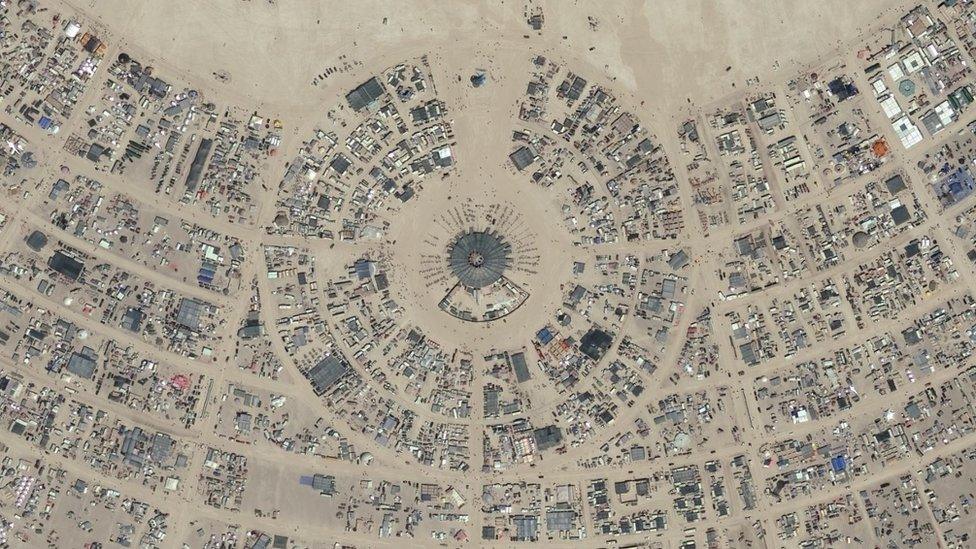
Part of Black Rock City, the temporary settlement in the Nevada desert where Burning Man takes place
For many, Burning Man conjures up images of dust-covered attendees, known as "burners", dancing in the desert cut off from society.
The annual arts and cultural gathering in the Black Rock desert in Nevada prides itself on "radical inclusion", "self-reliance" and providing a space for counter-cultural expression.
However, grumblings of discontent have been growing in the burner community for a number of years.
The increase in so-called "turnkey" or "plug-and-play" camps offering luxury and glamour for the super-rich or Insta-famous has become a source of tension at Black Rock City.
Some see these camps as fundamentally opposed to the basic tenets of Burning Man.
The lack of effort required by attendees staying in turnkey camps riles many. Burners can spend months preparing to head to the desert, collecting supplies and crafting outfits and art projects.
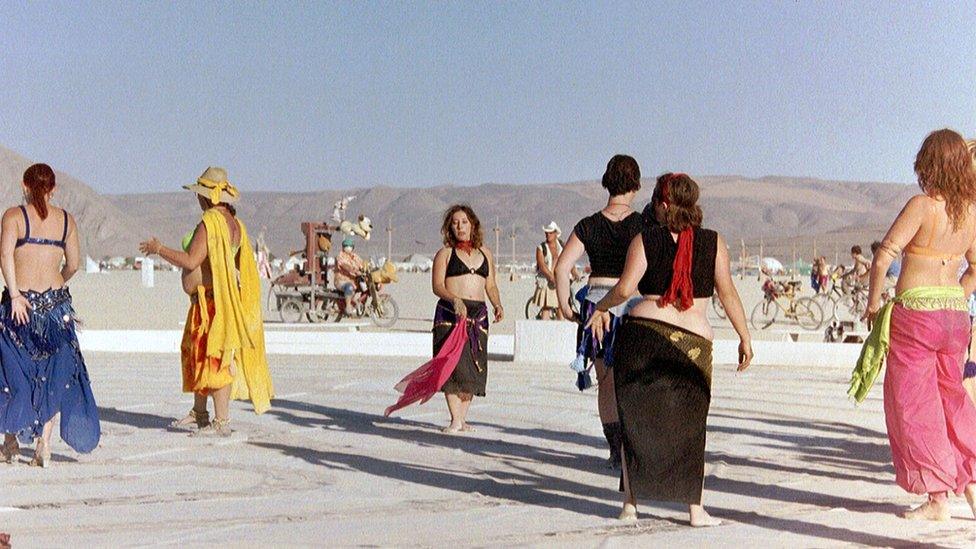
A group of women at Burning Man in 2003, before the growth of turnkey camps
In the wake of the disastrous Fyre Festival, the notion of exclusive Instagram-friendly festivals is in the spotlight and Burning Man has decided to take action.
Burning Man CEO Marian Goodell has taken the unprecedented step of withdrawing invitations to one turnkey camp - "Humano the Tribe" - and warning dozens of others.
In 2018, the most expensive accommodation at the Humano camp, the Moon Village, cost up to $100,000 according to Mashable, external and included two bedrooms and "super-powerful AC".
A quick search of #HumanoTheTribe on Instagram shows hundreds of posts by models and social media influencers, many tagging brands they are collaborating with.
Allow Instagram content?
This article contains content provided by Instagram. We ask for your permission before anything is loaded, as they may be using cookies and other technologies. You may want to read Meta’s Instagram cookie policy, external and privacy policy, external before accepting. To view this content choose ‘accept and continue’.

In a blog post, Ms Goodell wrote, external that she was "stunned" by the growing "commodification and exploitation of Black Rock City and Burning Man culture".
"Whether it's commercial photo shoots, product placements, or Instagram posts thanking 'friends' for a useful item, attendees including fashion models and social media 'influencers' are wearing and tagging brands in their playa photos. This means they are using Black Rock City to increase their popularity; to appeal to customers and sell more stuff."
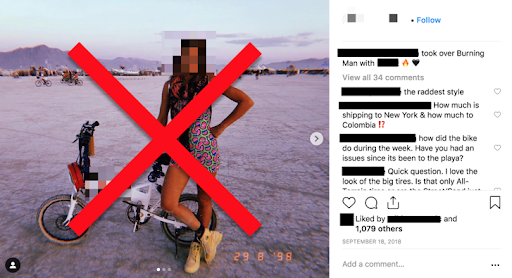
Burning Man are trying to fight the "commodification" of the event
"Black Rock City requires significant investments of time, energy, and resourcefulness," Ms Goodell wrote. "Part of what makes Burning Man unique and powerful is that everyone has to work hard to be there."
Ms Goodell's blog post also set out changes to the ticketing process, intended to prioritise those who contribute to the event.

Burning Man's 10 principles
Radical inclusion
Gifting
Decommodification
Radical self-reliance
Radical self-expression
Communal effort
Civic responsibility
Leaving no trace
Participation
Immediacy

Greg Reynoso, 29, has been attending Burning Man for almost a decade. In 2018 his camp, which was in the same neighbourhood as Humano, decided to move.
"The Humano camp was like a black hole of negativity," Greg told the BBC. "They would ride past on their Segways with their phones and wearing more money than I'll ever make. Not a single person was interested in saying hello or actually taking part."
Greg also said that the Humano campers were bad neighbours in other ways. "Placement - the process of designating plots - set strict boundaries for camps. Humano put their generators and containers on another camp's plot. That's a really big no no, but they didn't move it. It was astounding to me."
Reflecting on the statement made by Burning Man CEO Marian Goodell, Greg describes his response as "measured positivity".
"While Humano was one of the most egregious offenders for flexing their money and having a wanton disregard for the event, they are by no means the only turnkey camps," Greg says.
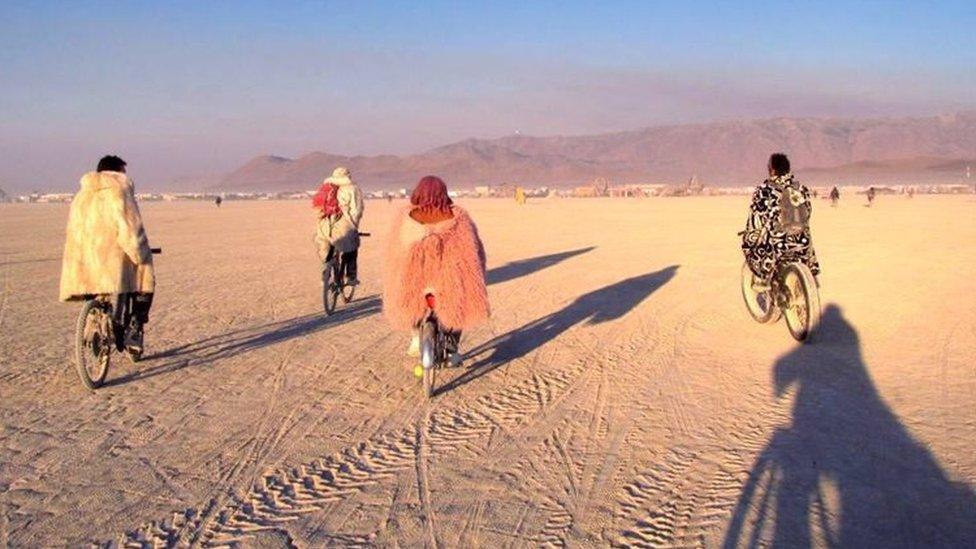
Greg (R) with some of his campmates in 2017
"To see Marian say she was "stunned" by some of the examples people had, made it feel like she hasn't attended for years. Everyone knows what's been happening."
Greg says an important part of Burning Man is the level of preparation it takes.
"I have a Word document with all the projects I am working on for this year, and I spend the majority of my free time working on them."
Debate has raged online and at the event for years over the influx of turnkey camps and many on social media seemed to agreed with Greg's conclusions.
On Reddit, some welcomed the announcement as "good news" and hoped it would act as a "warning shot" to other camps.
Allow X content?
This article contains content provided by X. We ask for your permission before anything is loaded, as they may be using cookies and other technologies. You may want to read X’s cookie policy, external and privacy policy, external before accepting. To view this content choose ‘accept and continue’.
Others were more sceptical. One user wrote: "This kind of top-down social engineering doesn't really work. The nature of the festival reflects the general culture of the US and world."
Another suggested that the organisers "let things get this far because it made them money and fame and didn't affect the brand too much... the brand has suffered and this is an attempt at repair".
Another questioned if action would be taken against "the companies carting models out there for commercial photo shoots".
"Arguably the biggest loss is the freedom people feel on playa to express themselves," one user wrote lamenting the increase in photography at the event. "As cameras are becoming so common it makes a lot of burners wary."
The BBC has contacted Humano the Tribe for comment.

More on Burning Man
Burning Man: Hedonistic festival's unlikely relocation
- Published4 September 2017
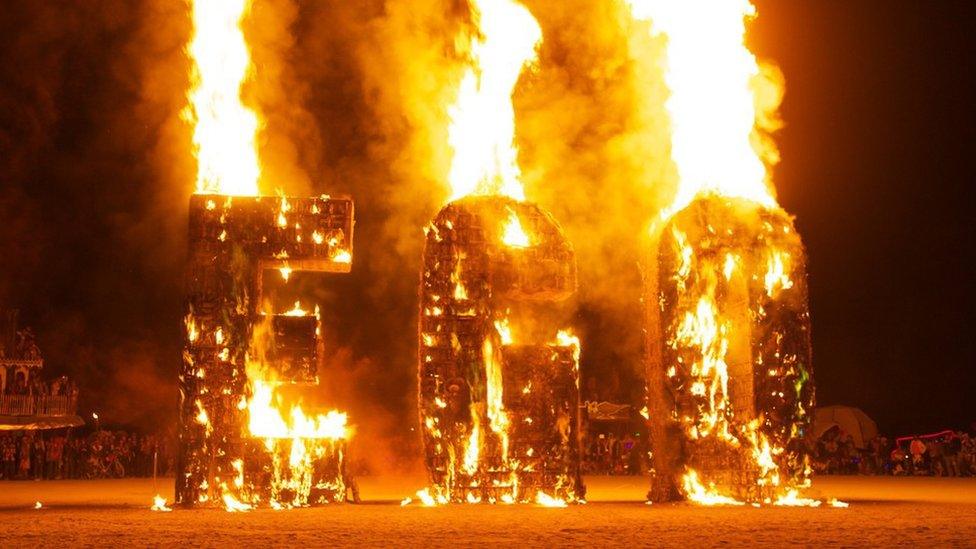
- Published8 April 2018
